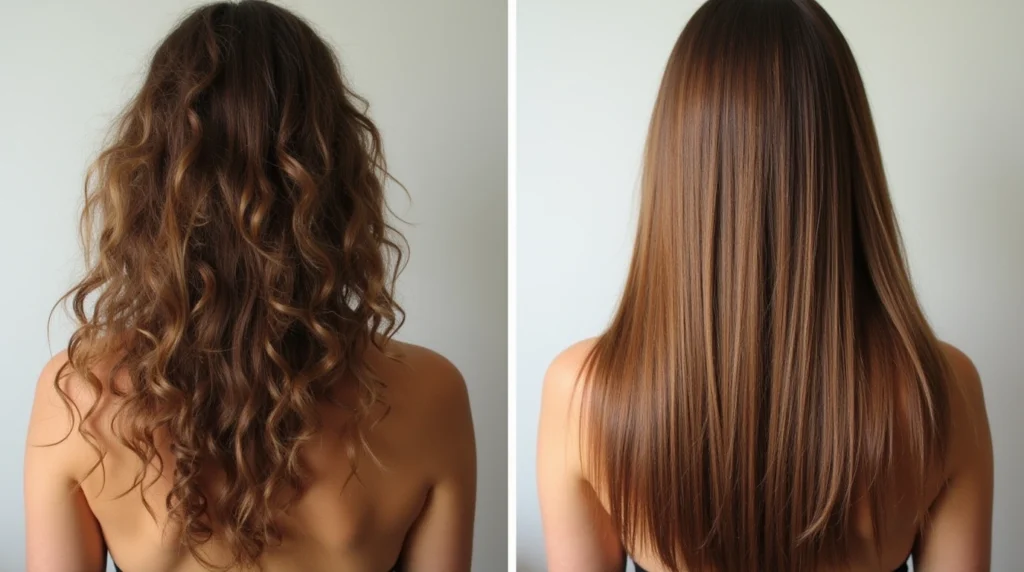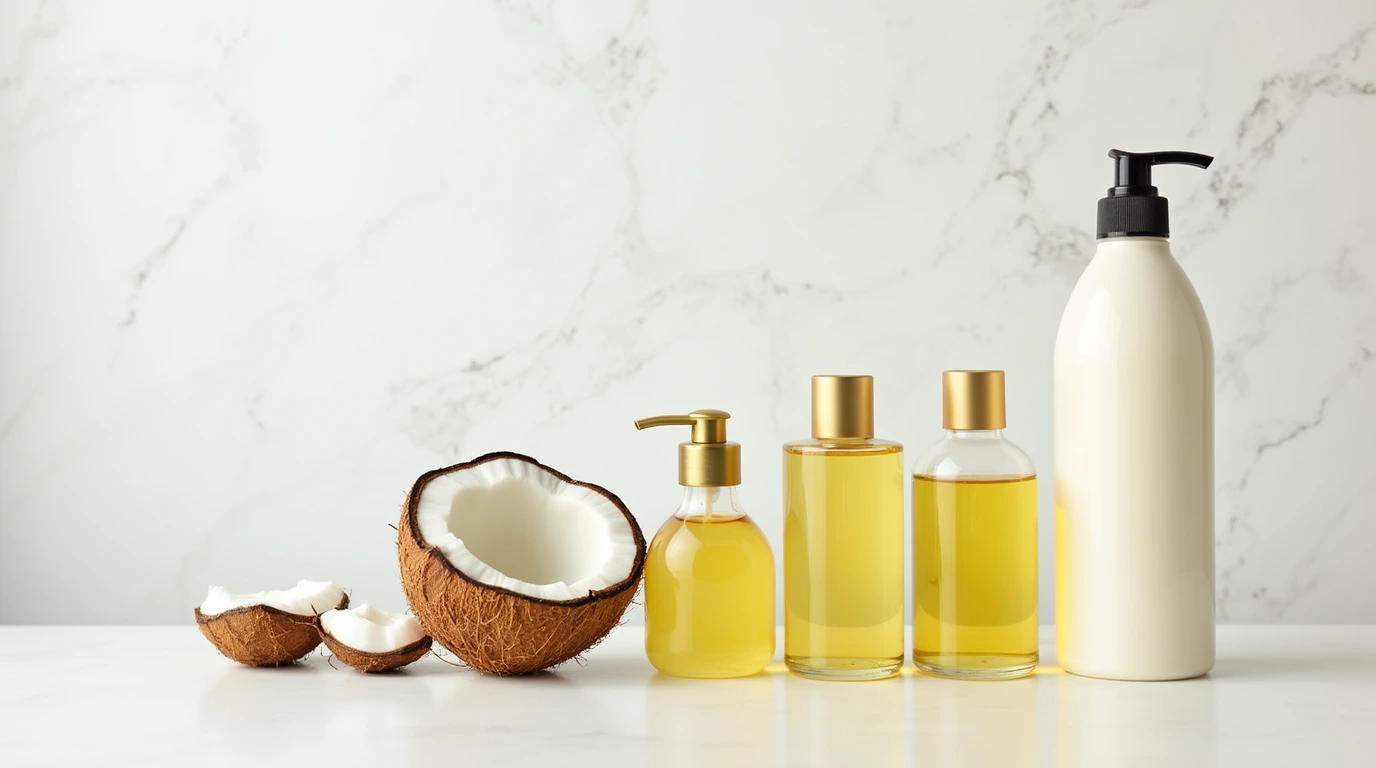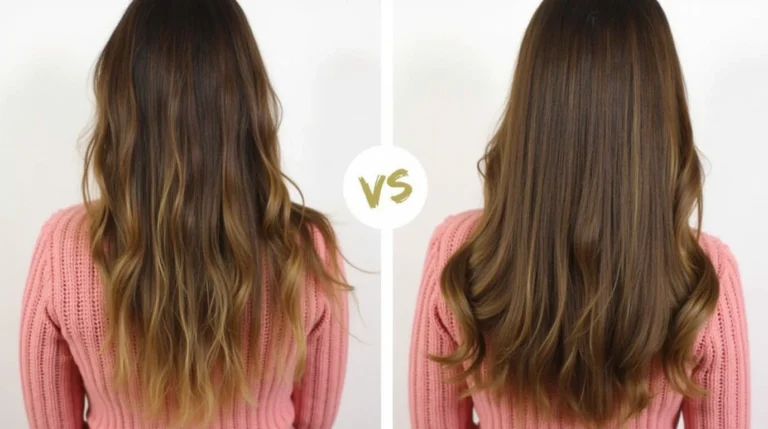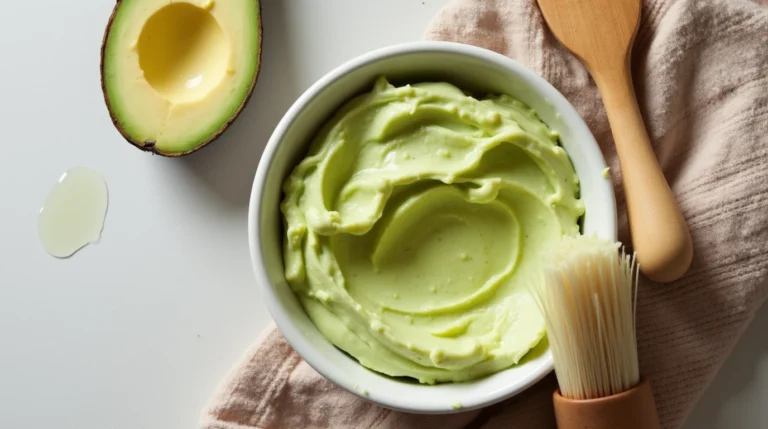Ever wished your hair felt like silk instead of straw? Coconut oil shampoo might be the answer. It’s not just a trend; it’s a natural fix that’s changing hair care in the U.S. If your hair feels dry, heavy, or lacks shine, this guide will help.
Imagine hair that’s soft, smooth, and full of life. Coconut oil shampoo is packed with moisture. It can make your hair feel amazing.

Struggling with dryness, frizz, or color-treated hair? This article explains how coconut oil shampoo works. It’s better than regular shampoo because it keeps moisture in and fixes damage without losing natural oils. Let’s explore the science behind its success and how it could be what you need.
Key Takeaways
- Coconut oil shampoo deeply moisturizes, combating dryness and breakage.
- Its natural compounds penetrate hair strands to strengthen and protect.
- Hydrating coconut oil shampoo suits all hair types, from curly to color-treated.
- It helps restore damaged hair without harsh chemicals.
- Learn how to pick the best formula for your unique hair needs.
What Makes Coconut Oil Shampoo Different from Regular Shampoo
Most shampoos take away natural oils, making hair dry and brittle. Coconut oil shampoo is different. It uses coconut oil shampoo’s special chemistry to fix hair from the inside. This gives benefits of coconut oil shampoo that regular shampoos can’t.
“Coconut oil’s small molecules penetrate hair strands to strengthen bonds at a microscopic level.”
The Science Behind Coconut Oil’s Hair Benefits
Coconut oil has lauric acid, a fatty acid that sticks to hair protein. This natural compound helps keep hair protein in during washing, by up to 30%, studies show. Look for coconut oil shampoo as the first ingredient for best results.
How Coconut Oil Penetrates the Hair Shaft
- Small molecular structure allows deep penetration into hair cuticles
- Forms protective lipid layers around each strand
- Repairs split ends at cellular level
Key Ingredients in Quality Coconut Oil Shampoos
Good formulas have:
- At least 15% cold-pressed coconut oil
- Vitamin E for antioxidant protection
- No sulfates or parabens to preserve oil’s purity
Choosing products with these ingredients means your coconut oil shampoo will give you real benefits of coconut oil shampoo. You’ll see less breakage and shinier hair. Always check the ingredients to avoid harmful additives.
The Remarkable Benefits of Coconut Oil Shampoo
Learn how benefits of coconut oil shampoo can change your hair care. Hydrating coconut oil shampoo deeply moisturizes, stopping dryness and breakage. It strengthens hair by fixing damage from heat, dye, or the environment.
- Moisturizes dry hair, restoring natural shine
- Reduces protein loss by up to 58% compared to regular shampoos
- Minimizes frizz and split ends for smoother texture
- Promotes scalp health by balancing oil production
“Coconut oil’s lauric acid penetrates hair shafts, offering long-term protection against environmental damage.” – Journal of Cosmetic Science, 2022
Visible improvements start in 4-6 weeks with regular use. Those with severely damaged hair see less breakage first. Natural shine appears after 8-10 weeks.
For dandruff-prone scalps, coconut oil’s antimicrobial properties cut flakiness by up to 70% in trials. Unlike regular shampoos, hydrating coconut oil shampoo creates a protective layer without stripping natural oils.
Regular users notice softer textures and easier styling in weeks. It tackles dryness, color-treated strands, or split ends, adapting to your hair’s needs. Science-backed results meet everyday hair care in one simple step.
How to Choose the Best Coconut Oil Shampoo for Your Hair Type
Not all coconut oil shampoos are the same for every hair type. Choosing the right one for your hair ensures the best results. Here’s how to pick the perfect shampoo for your hair.
For Dry and Damaged Hair
For dry and damaged hair, look for best coconut oil shampoo with 10%+ coconut oil. Add moisturizers like argan oil or shea butter. Stay away from sulfates that remove natural oils. Try SheaMoisture Coconut & Hibiscus Shampoo for deep hydration.
- Key ingredients: coconut oil, panthenol, keratin
- Avoid: sodium lauryl sulfate
For Oily Hair and Scalp
For oily hair and scalp, choose lightweight coconut oil shampoo with tea tree oil or apple cider vinegar. These ingredients help control oil. Look for “oil-control” labels to avoid greasiness.
- Pick: Acure Organics Clarifying Shampoo
- Use 2-3 times weekly to cleanse without drying
For Curly and Textured Hair
Curls love coconut oil’s moisture. Choose creamy formulas with silk or aloe to reduce frizz. Devacurl Moisture Rich Shampoo with coconut oil keeps hair hydrated without weighing it down.
For Color-Treated Hair
Color-treated hair needs sulfate-free shampoos like Paul Mitchell Color Safe Shampoo. These keep colors bright by protecting the cuticle. Look for UV filters to prevent fading.
Always read labels. Ingredients like behentrimonium methosulfate improve slip, while silicones can build up on fine hair. Always test new products to avoid bad reactions.
Step-by-Step Guide to Using Coconut Oil Shampoo Effectively
Get the most out of your coconut oil shampoo by following these steps. Proper application ensures your hair stays moisturized and healthy. Adjust techniques based on your hair type for best results.

Proper Application Techniques
Follow these steps for optimal results:
- Thoroughly wet hair before applying coconut oil shampoo to open cuticles and boost absorption.
- Dispense 1-2 pumps (based on hair length) and lather gently, focusing on roots and ends to distribute evenly.
- Let sit 2-3 minutes to allow the hydrating coconut oil shampoo to penetrate strands before rinsing.
How Often to Wash with Coconut Oil Shampoo
Adjust washing frequency to your hair type:
- Dry/Damaged Hair: 2-3 times weekly to retain moisture without over-cleansing.
- Oily Scalp: Every 2-3 days to balance oil production without stripping natural oils.
- Curly/Coarse Hair: 1-2 times weekly to preserve natural oils and prevent dryness.
- Color-Treated Hair: 1-2 times weekly to maintain color vibrancy and hydration.
In dry climates or active lifestyles, increase rinses slightly but avoid daily use to prevent dryness or greasiness.
Combining with Conditioner for Maximum Benefits
Enhance results by pairing your shampoo with the right conditioner:
- Apply a moisturizing conditioner post-wash to seal in coconut oil’s nutrients.
- For extra hydration, leave conditioner on ends 3-5 minutes before rinsing.
- Opt for lightweight formulas if your hair is fine or oily to avoid buildup.
Always rinse conditioner thoroughly to prevent residue buildup.
Natural and Organic Coconut Oil Shampoo Options
Choosing a natural coconut oil shampoo means you care about purity. Look for USDA Organic or ECOCERT certifications. These ensure the shampoo avoids synthetic additives. It uses unrefined coconut oil, keeping your hair nourished and your scalp healthy.
- Aloe vera: soothes the scalp and adds moisture.
- Honey: acts as a humectant to lock in hydration.
- Essential oils: like lavender or tea tree, enhance aroma and provide antimicrobial benefits.
“Natural preservative systems using vitamin E or rosemary extract maintain freshness without compromising safety.”
Choose brands that are open about where they get their ingredients. Coconut oil shampoo labeled “cold-pressed” keeps enzymes active. Stay away from products with parabens or synthetic fragrances. True naturals use plant-based alternatives.
Some great options include Shea Moisture Coconut & Hibiscus Shampoo for elasticity or Acure Coconut Milk line for a vegan choice. Always check the ingredient list. If it says “sodium lauryl sulfate,” it’s synthetic and should be avoided.
Natural shampoos last longer, 6–12 months, compared to 2–3 years for regular ones. Keep them in a cool, dark place to keep them effective. Look for brands that have third-party testing for purity, like Desert Essence or Alaffia.
Why Sulfate-Free Coconut Oil Shampoo Is Worth the Investment
Sulfate-free coconut oil shampoo is a gentler choice than harsh chemicals. Regular shampoos often have sulfates like SLS or SLES. These can strip your hair of natural oils and upset your scalp’s balance. Switching to sulfate-free coconut oil shampoo helps keep your hair healthy and shiny.
Understanding Harmful Sulfates in Hair Products
Sulfates are like strong detergents that dry out your hair, cause split ends, and fade color. They weaken hair strands and can irritate sensitive scalps. Coconut oil shampoo uses mild cleansers like coco glucoside instead. These clean without taking away moisture.
Long-Term Benefits of Going Sulfate-Free
Without sulfates, your hair keeps its natural oils, reducing frizz and breakage. Color-treated hair stays bright longer, and your scalp’s balance is maintained. At first, your hair might feel oily—a sign of adjustment. But, as your scalp adjusts, this feeling goes away.
Regular use makes your hair stronger, softer, and less damaged.
Top Sulfate-Free Coconut Oil Shampoo Brands
- Shea Moisture Coconut & Hibiscus Shampoo: Rich in coconut milk and shea butter for deep hydration.
- Acure Coconut Milk Clarifying Shampoo: Cleanses without sulfates, great for color-treated hair.
- Ethique Solid Coconut Oil Shampoo Bar: A zero-waste option that lathers well and nourishes hair.
These brands focus on gentle, effective ingredients. Look at prices and ingredients to find the best for your hair. Although it might cost more upfront, it saves money in the long run by reducing damage and split ends.
Treating Dry Scalp and Dandruff with Coconut Oil Shampoo
Coconut oil shampoo helps dry scalp with its natural ingredients. It moisturizes and fights fungal growth that causes dandruff. It goes deep into the scalp to fix problems at the root.
How Coconut Oil Addresses Root Causes of Scalp Issues
Coconut oil’s lauric acid stops fungus that leads to dandruff. Its fatty acids lock in moisture to fight dryness. Anti-inflammatory compounds soothe redness and irritation. Together, they balance your scalp.
Complementary Ingredients to Look For
- Tea tree oil: Enhances antifungal action
- Salicylic acid: Gently exfoliates flaky skin
- Pyrithione zinc: Reduces scalp inflammation
Choose shampoos with these additives and coconut oil for better results.
Treatment Regimen for Persistent Scalp Problems
- Wash 2-3 times weekly with coconut oil shampoo for dry scalp
- Pre-wash: Massage warm coconut oil into scalp 15 minutes before washing
- Lather thoroughly for 2 minutes to ensure ingredients penetrate the scalp
Follow this routine for 4-6 weeks to see improvement. If no change after 2 months, see a dermatologist.
Coconut Oil Shampoo for Hair Growth and Thickness
Coconut oil shampoo helps hair grow by making strands stronger. This reduces breakage, making hair look thicker and longer. It keeps hair healthy, not just growing new hair.

Lauric acid in coconut oil shampoo locks in moisture. It cuts down protein loss by up to 33% compared to regular shampoos. This makes each strand stronger, preventing split ends and thinning.
Regular use keeps hair length, making it seem like it’s growing.
Key growth-boosting ingredients to look for include:
- Caffeine: Stimulates blood flow to follicles
- Biotin: Strengthens keratin structure
- Peppermint oil: Promotes scalp circulation
| Ingredient | Benefit |
|---|---|
| Caffeine | Increases follicle metabolism |
| Biotin | Reduces porosity and breakage |
| Peppermint oil | Encourages healthy follicle environment |
For best results, massage shampoo into roots for 2-3 minutes. This boosts circulation. Consistency is key—visible improvements usually show in 8-12 weeks with twice-weekly use. Use with heat protection and protein treatments for the best results.
Ethical Choices: Cruelty-Free and Vegan Coconut Oil Shampoo Brands
When picking a cruelty-free coconut oil shampoo, look for specific signs. Check for certifications like Leaping Bunny or PETA’s Beauty Without Bunnies. These show the product hasn’t been tested on animals, even in its supply chain.
True vegan coconut oil shampoo doesn’t use animal products at all. It’s important to know the difference between “not tested on animals” and vegan.
Understanding Cruelty-Free Standards
Certifications are key. Brands like Ethique or Acure follow global cruelty-free standards. Stay away from products made in countries that require animal tests, like China.
Choose brands that refuse to sell in such countries. This ensures they stay true to their ethical values.
Going Vegan: Ingredient Swaps That Work
- Keratin replaced with silk protein from plants
- Lanolin substituted with coconut-based emollients
- Honey replaced with agave syrup in vegan coconut oil shampoo
Shea Moisture and Giovanni make effective vegan shampoos. They don’t sacrifice quality for animal welfare.
Sustainable Packaging Options
| Material | Brand Example | Environmental Impact |
|---|---|---|
| Recycled Plastic | Plaine Products | 100% post-consumer plastic |
| Moldable Bamboo | OSEA | Biodegradable in 6 months |
| Refill Systems | Ethique | Cuts plastic use by 80% |
Plaine Products’ refillable bottles save a lot of plastic. They cut down on plastic waste by 30+ containers a year.
DIY Coconut Oil Shampoo Recipes to Try at Home
Making your own natural coconut oil shampoo lets you control what goes into it. It also saves you money. These recipes use simple kitchen items to make effective shampoos for your hair.
Start with 1/4 cup liquid castile soap, 1/4 cup melted coconut oil, and 10 drops of tea tree oil. Mix them in a bottle. Shake it well before each use. This is great for normal to oily hair.
- Repair-Focused Formula:
Mix 1/2 cup coconut oil, 1/4 cup aloe vera gel, and 2 tbsp honey. Add 15 drops of rosemary oil. Put it in a pump bottle. Honey adds moisture, and rosemary helps hair grow.
Pro tip: For fine hair, use jojoba or avocado oil instead of coconut oil. This avoids heaviness. Add 1 tsp apple cider vinegar to keep the pH balanced.
- Troubleshooting Tips:
- Is it separated? Shake it well to mix it again.
- Do you have greasy roots? Cut down coconut oil by 1 tbsp.
- Does it lack lather? Add 1 tsp baking soda for more foam.
Homemade shampoos are 50-70% cheaper than store-bought coconut oil shampoo. Keep them in a cool place for up to 3 months. Always test new oils on a small area first to avoid skin irritation.
Conclusion: Transform Your Hair Care Routine with Coconut Oil Shampoo
Choosing the right coconut oil shampoo can change your hair care game. It’s great for dry, damaged, or color-treated hair. Coconut oil’s oils deeply moisturize and protect your hair.
Find a shampoo that matches your hair type. Look for shea butter or aloe for extra moisture. Or, choose lightweight options for oily scalps.
Start by slowly replacing your regular shampoo. Use it 2–3 times a week to let your hair get used to it. Pair it with a matching conditioner for the best results.
Brands like Cocogoat or Desert Essence offer sulfate-free options. These keep your hair healthy without stripping it of natural oils. Remember, it takes time to see the full benefits.
New trends bring even better coconut oil shampoos. They use cold-pressed oils and mixable ingredients. Your hair’s response will depend on its condition. But, coconut oil is proven to strengthen and nourish your hair.
Take the first step today. Look for top-rated coconut oil shampoos, read reviews, and pick one that fits your hair goals. A simple switch to coconut oil-based care can greatly improve your hair’s health.
FAQ
What are the benefits of using coconut oil shampoo?
Coconut oil shampoo deeply moisturizes your hair. It reduces protein loss and improves scalp health. It also makes your hair easier to manage.
It helps restore damaged hair’s elasticity and reduces frizz. This makes your scalp healthier, making it a great choice for many hair types.
How does coconut oil shampoo promote hair growth?
Coconut oil shampoo doesn’t directly grow new hair. But, it protects your hair from breaking. This makes your hair look thicker.
Its moisturizing properties also improve scalp health. This creates a better environment for hair growth and reduces thinning.
What should I look for in the best coconut oil shampoo?
Look for coconut oil shampoo with high coconut oil content. Choose unrefined or virgin coconut oil for the best benefits.
Make sure it’s sulfate-free. Also, look for natural ingredients like aloe vera or essential oils. These can enhance the shampoo’s effectiveness for your hair.
Is coconut oil shampoo suitable for all hair types?
Yes, coconut oil shampoo works for all hair types. But, the right formula depends on your hair needs.
For dry and damaged hair, choose heavier oils. For oily hair, go for lighter formulas. Always pick a product made for your hair type.
Can I use coconut oil shampoo if I have a dry scalp or dandruff?
Yes, coconut oil shampoo is good for dry scalp and dandruff. It has antimicrobial and anti-inflammatory properties.
It soothes irritated skin. Adding tea tree oil can improve results even more.
Are there cruelty-free and vegan coconut oil shampoo options?
Many brands offer cruelty-free and vegan coconut oil shampoos. Look for Leaping Bunny or PETA-approved logos.
Check the ingredient list for animal products. This ensures the shampoo meets your ethical standards.
How often should I wash my hair with coconut oil shampoo?
Washing frequency with coconut oil shampoo varies by hair type. Dry hair can wash twice a week.
Oily scalps may wash every other day. Adjust based on your lifestyle and activity levels for the best results.
What are some natural and organic coconut oil shampoo brands?
Many brands offer natural and organic coconut oil shampoos. Look for organic certifications and virgin coconut oil.
Choose products with minimal synthetics. Research helps find genuine benefits without unnecessary additives.








One Comment
Comments are closed.